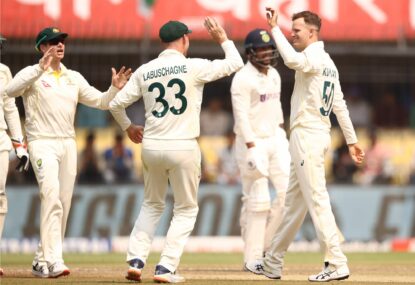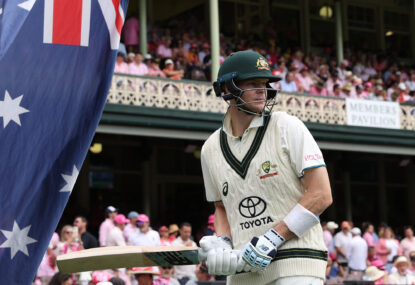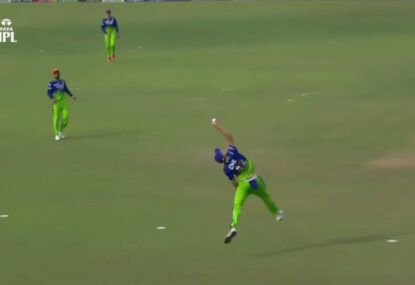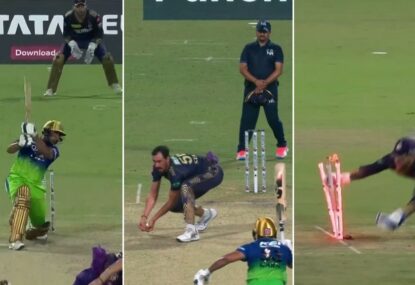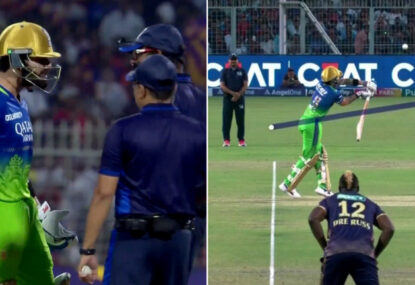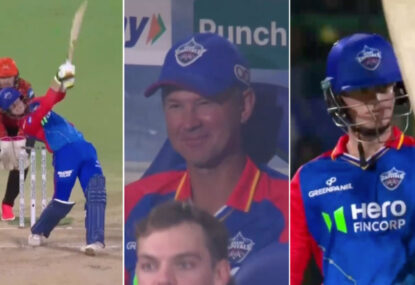The P Team is an interesting one in that there are five or six current international cricketers who might reasonably earn a spot in the team by the time their careers have ended.
Of those, Kevin Pietersen and Matt Prior have had long enough careers to date to warrant serious consideration, but I am hoping that their records plummet substantially over the next six months, hence their omission. The P Team is:
1. Bill Ponsford
2. Geoff Pullar
3. Ricky Ponting (c)
4. Graeme Pollock
5. Eddie Paynter
6. Mike Procter
7. Jim Parks (wk)
8. Shaun Pollcock
9. Peter Pollock
10. Bobby Peel
11. Erapalli Prasanna
The absence of Pietersen, let alone the presence of a number of absolute greats, tells you how strong a batting side this is, while the bowling has great depth and variety with Procter playing as an all-rounder. A little bit on each member:
1. Bill Ponsford
Australia, RHB, 29 Tests, 2122 runs at 48.23, seven 100s
I have always thought that, like his fellow opener in the Team of the Century, Arthur Morris, Ponsford’s record was overly flattering.
Now that might seem an outrageous statement about a player with a 48 Test average and a 65 First Class average, who is a former Test partnership world record holder and is the only man to score tons in his first and last two Tests. And that’s before the small matter of two First Class quadruple tons and two more triples.
But take out his first two and last two Tests, his record is a Phil Hughes-esque 25 Tests, 1388 runs at 33.86, over a period of 10 years.
Still, on legend alone he comfortably makes this side.
2. Geoff Pullar
England, LHB, 29 Tests, 1974 runs at 43.87, four 100s
Pullar’s very good Test record would have been even better if it wasn’t for Alan Davidson.
Davo dismissed him eight times in nine Tests, reducing Pullar’s average against Australia to 27. No one else in Tests dismissed him more than three times.
In any case, Pullar’s Test average was substantially better than his long First Class career average, suggesting that, Davidson aside, he was not intimidated by opening at Test level generally.
His Test career virtually ended when he got ill on the tour of Australia in 1962/3, was left out of the Test team and was subsequently overlooked for a young Geoff Boycott.
3. Ricky Ponting (c)
Australia, RHB, 168 Tests (77 capt), 13378 runs at 51.85, 41 100s
Ponting is Test cricket’s ‘winningest’ player and for a period there had claims of being the best after Bradman.
I’ve always thought that the Monkeygate series was the start of his decline as a batsman, possibly following his sense of abandonment by the Cricket Australia (and much of the press) in its aftermath.
At the start of that series, his record was 112 Tests, 9571 runs at 59.43 – comfortably in the realms of anyone other than Bradman.
After that Test, his record was 56 Tests, 3807 runs at 39 and it was sad to see his decline in his last few seasons.
Still, his peak period was so sustained and was at such a dominant level that he should always be talked about as among the game’s finest ever from any era.
4. Graeme Pollock
South Africa, LHB, 23 Tests, 2256 runs at 60.97, seven 100s
Of the ‘Big Three’ (Pollock, Procter and Barry Richards) whose careers were cut short by isolation, this mighty left-hander had at least had played enough Test cricket for no one to be in any doubt as to what was lost from the international game.
Australians, due to apartheid, were Pollock’s chief punching bag, with him plundering 1453 runs at 69 off Australian attacks.
Even at the age of 42, Pollock was good enough to smash 144 against Kim Hughes’ rebels.
5, Eddie Paynter
England, LHB, 20 Tests, 1540 runs at 59.23, four 100s
Paynter was one of the few Englishman to end the Bodyline series with the admiration of the Australian crowds. This was due predominantly to his stoic and ultimately match-winning 83 at the Gabba after being told by Douglas Jardine that he had to get out of his hospital bed to bat as England were in trouble.
For someone of his overall record, which is substantially better than his First Class record, it is surprising that Paynter was omitted from so many England sides in the 30s.
When he came back into the team after a four-year absence, he showed what the selectors had been missing out on – in his back-to-back series against Australia and South Africa he scored a combined 1060 runs at 88.
Eventually WWII ended his career.
6. Mike Procter
South Africa, RHB, RF, seven Tests, 226 runs at 25.11, 41 wickets at 15.02
It’s hard to imagine anyone being as good a bowler as Procter while also matching his batting.
His First Class figures are ridiculous – 22,000 runs, 48 hundreds, 1400 wickets at 19.53.
He is the only person to have taken two all-LBW hat-tricks in First Class cricket and only he, Bradman and CB Fry have scored six consecutive First Class hundreds.
The great tragedy was his forced absence from Test cricket and a wider audience to marvel in his skills.
As an ICC Match Referee, he presided over two of the most controversial matches in recent years – Pakistan’s forfeit at the Oval in 2006 and then the Monkeygate Test.
7. Jim Parks (wk)
England, RHB, 46 Tests, 1962 runs at 32.16, two 100s, 112 dismissals (101/11)
Although he made his Test debut as a batsman, Parks was England’s most regular keeper between the Godfrey Evans and Alan Knott eras.
He is the 13th most prolific keeper in First Class cricket and only Les Ames has scored more than his 36,673 runs and 51 centuries.
8. Shaun Pollcock
South Africa, RHB,RFM, 108 Tests (26 capt), 3781 runs at 32.32, two 100s, 421 wickets at 23.21
Shaun was so understated and so utterly consistent that it is easy to overlook the simple fact that he did his basic job of taking as many wickets as possible for as few runs as possible as well as anyone.
After his 50th Test he had 210 wickets at 19.87 – no other bowler has ever had a running career average below 20 having taken 200 wickets – and even after 73 Tests he had 299 wickets at 20.50.
In his last few seasons, as years of non-stop cricket took its toll and his pace dropped, he became less effective.
But if you look through his match by match statistics it is littered with returns like 2/40, 3/60 and 4/80 but relatively few five-plus wicket hauls, reflecting his marvelous consistency.
9. Peter Pollock
South Africa, RHB, RF, 28 Tests, 607 runs at 21.68, 116 wickets at 24.19
Graeme’s older brother (and Shaun’s father) was also one of South Africa’s finest pace bowlers and was another who lost a large portion of his career due to isolation.
At Trent Bridge in 1965, Peter took 10 for 87 in the match while Graeme scored 125 and 59 as South Africa won the series.
In the whitewash series of 1970, while his brother and Richards were scoring all the runs, Peter was quietly doing his job with ball, taking 15 wickets at 17.
10. Bobby Peel
England, LHB, SLA, 427 runs at 14.72, 101 wickets at 16.98
Peel was another immensely consistent bowler. He only failed to take three wickets in at least one of the innings in four of his 20 Tests.
He was one of the main protagonists in the race to be the first to take 100 wickets, with Johnny Briggs eventually winning by a couple of Tests.
His career ended controversially when, in a County match in 1897 he was alleged to have come back from lunch well lubricated and, in an act of protest over pay, had a metaphorical slash outside off stump in front of the erstwhile England captain, Lord Hawke.
That alone gets Peel into my side.
11. Erapalli Prasanna
India, RHB, ROS, 49 Tests, 735 runs at 11.48, 189 wickets at 30.38
One of the famous Indian spin quartet of the 60s and 70s and highly regarded by Ian Chappell in particular, Prasanna took five years out of his career to finish his Engineering degree.
In his second Test back he took 0/187 off 59 overs as Geoff Boycott bored the world stupid with 246*. Prasanna had the last laugh however as it was Boycott, not he, who was dropped for the next Test.
Like most Indian spinners, Prasanna’s home record was far superior to his away record (95 at 27 versus 94 at 34).





























































































